What else but alcohol should be in the pretty glass bottles with cork and red-gold agraffe? Well, the PriSeccos from Manufaktur Jörg Geiger do sparkle like champagne and play with the vocabulary of vinology. But the cuvées do not contain alcohol, but the whole diversity of a Swabian meadow orchard.
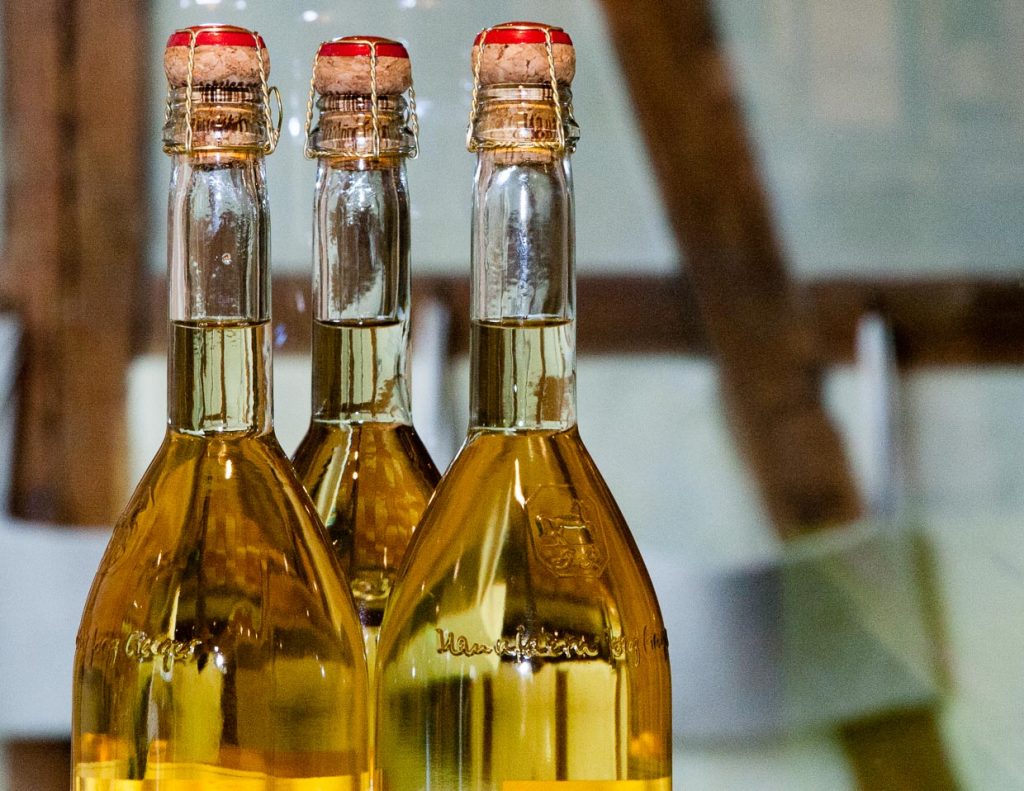
Orchard meadows are biotopes. They are full of herbs and shrubs that bear flowers and form seeds. And in the middle of it all, I’m standing with Jörg Geiger, entrepreneur and explorer. He lives both with great passion and unrelenting commitment. Over the years, he has acquired ancient knowledge about herbs and fruit varieties. With his prior training as a chef, he is able to boldly combine flavors and use the tart flavors of tannin-rich fruits in his creations. He then bottles the cuvées using state-of-the-art technology. But everything starts with the meadow orchard with its towering, sometimes very old giant trees. They must be preserved and, where possible, new ones planted for future generations.
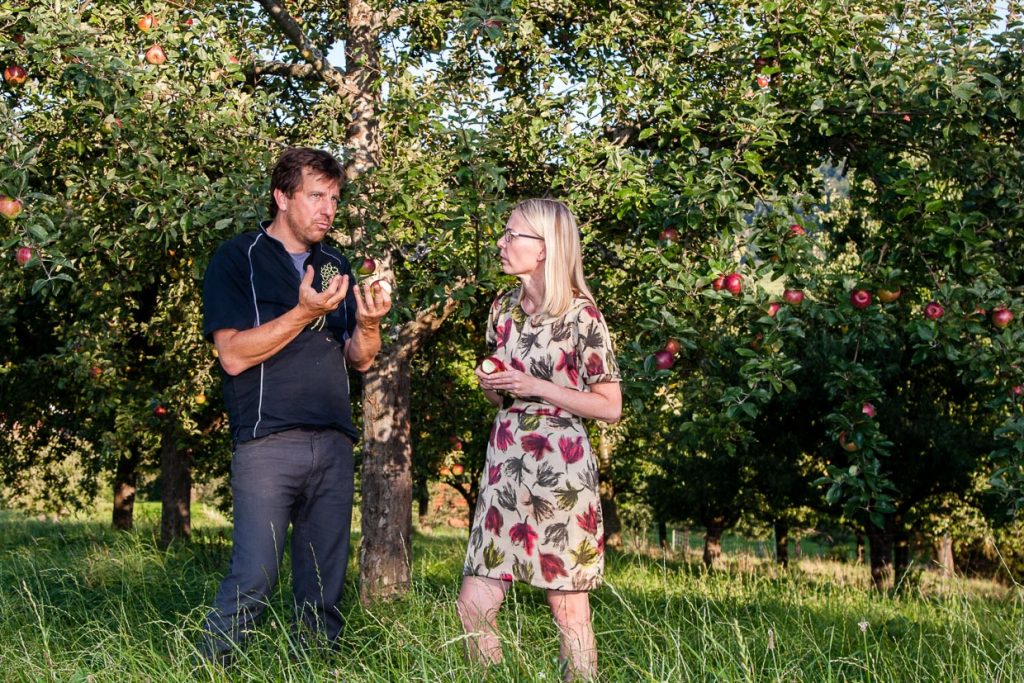
Making the most of nature’s possibilities
The trained chef leads the family business, whose nucleus is the Gasthaus Lamm in Schlat, into new dimensions of taste and also business. What began as a chance product at a wedding celebration at the inn in 2003 has since gone into impressive serial production. The wedding party back then wanted a non-alcoholic celebratory drink. Host Geiger experimented with meadow fruit, sour cherry and black currant. The result was the Rotfruchtige, a product that is now the classic in the Geiger manufactory’s range.
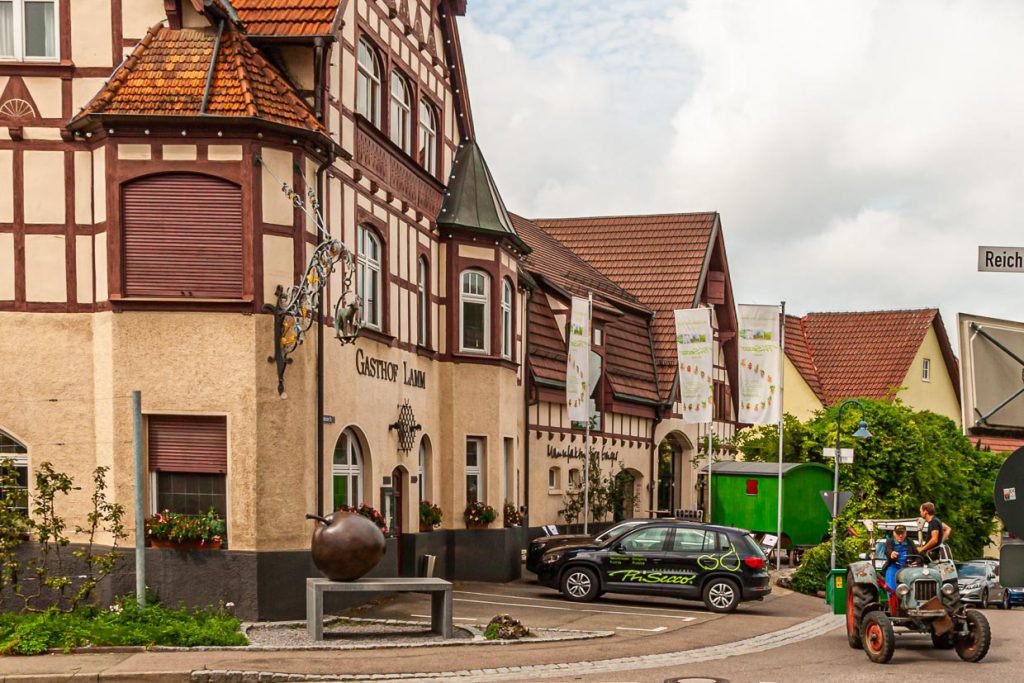
Complex recipes with up to 50 components
The success proves Geiger right. There is a need for non-alcoholic alternatives to wine and sparkling wine. There are really many reasons why people don’t like or shouldn’t drink alcohol, but there is no sensible reason for giving these guests only an apple spritzer to choose from. In any case, Jörg Geiger creates new non-alcoholic varieties every year. At the moment, he has arrived at 36 worthwhile alternatives to apple spritzer.
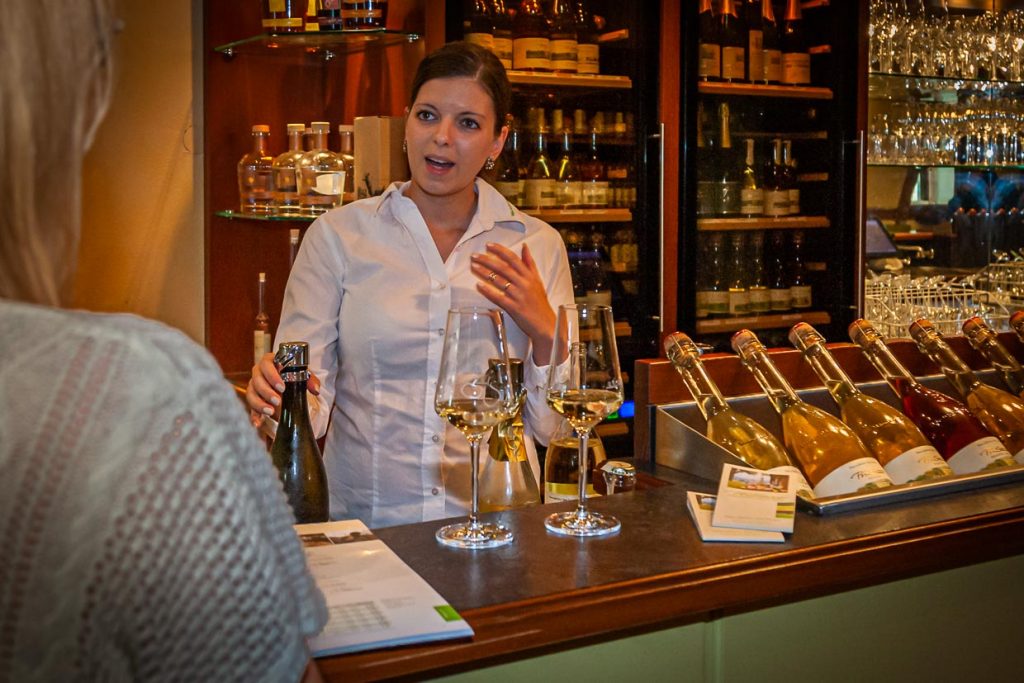
For example, there’s Green Hunting Pear – Hawthorn – Wood or Pear – Blackthorn – Douglas Fir, or how about Apple – Nettle – Gooseberry Leaf? Behind the exciting triad of bottle labels, there is always a diverse spectrum of aromas from 20 to 50 natural ingredients. Geiger calls the still version of the sparkling PriSeccos Inspiration. Nuanced and complex, they complement many a main course perfectly. Geiger took inspiration here from the characteristics of the most important types of wine. The result is a non-alcoholic food companion like Inspiration 4.0 Cherry – Bell Pepper – Beetroot. Goes well with roast fillet of beef, dark poultry with strong sauces or lamb.
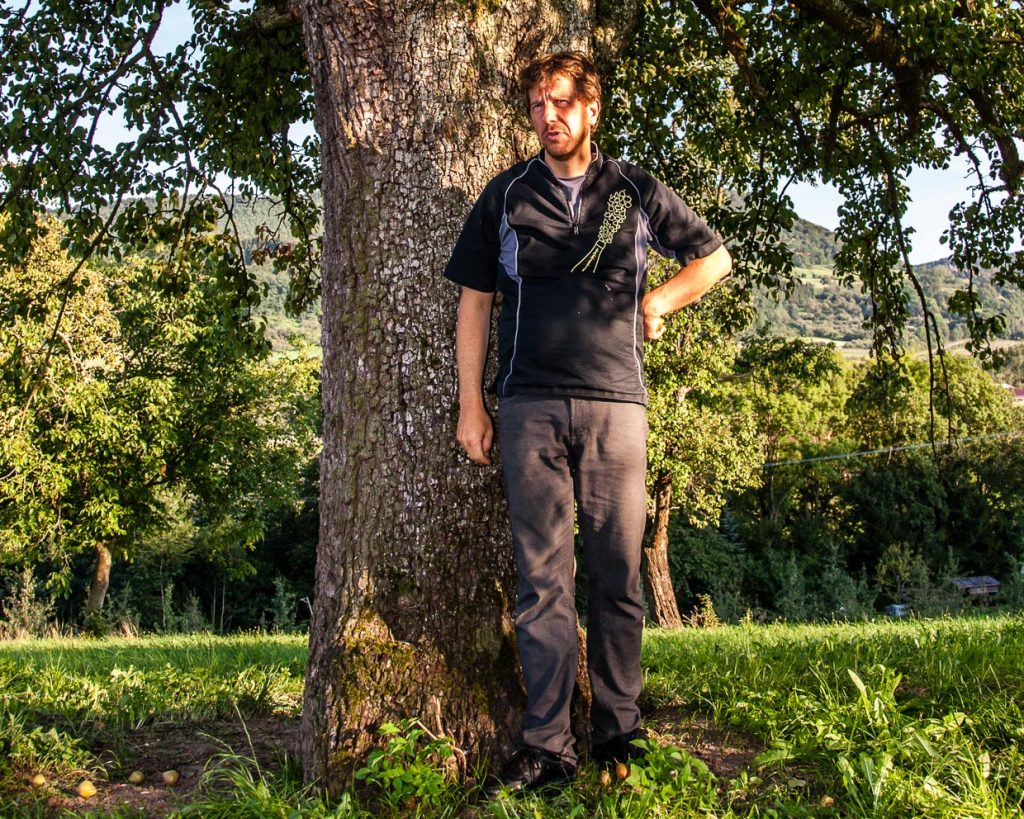
Ringing names: from Goldparmäne to Champagne Bratbirne
Jörg Geiger asked himself why many of the old fruit varieties were bred in the past. What use do they have? What use did people have for them back then? After all, it was only 50 years ago that non-alcoholic fruit juice was produced for the first time. Before that, the fruit went into fermentation and distillation. A walk through a meadow orchard teaches how to read the rhythm of the year.
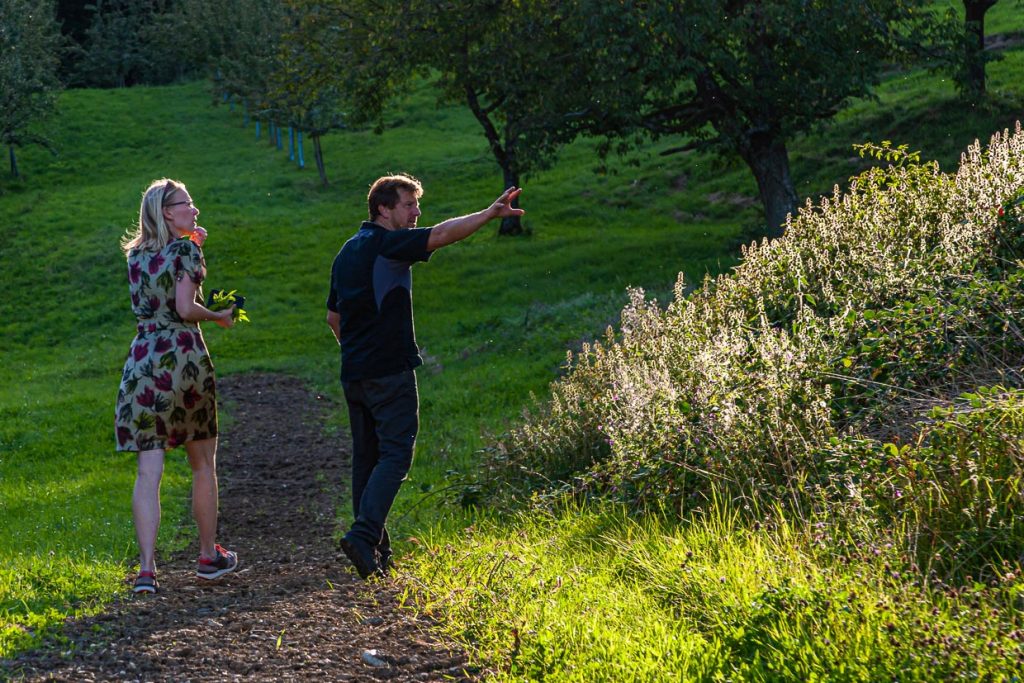
Why is it so important to process fruit from meadow orchards? What is the difference between plantation fruit and fruit from old trees? “Fruit flavor, Geiger explains, is a question of rootstock. Old fruit trees, which have deep roots, bring much more minerality due to the widely branched root system. Plantation fruit is mainly supplied from the leaf and thus cannot add as much to the aroma because it lacks the root mass in the subsoil in comparison. Acidity formation also requires supply from below through the roots. Sweetness is formed by nitrogenous substances from the leaf.”
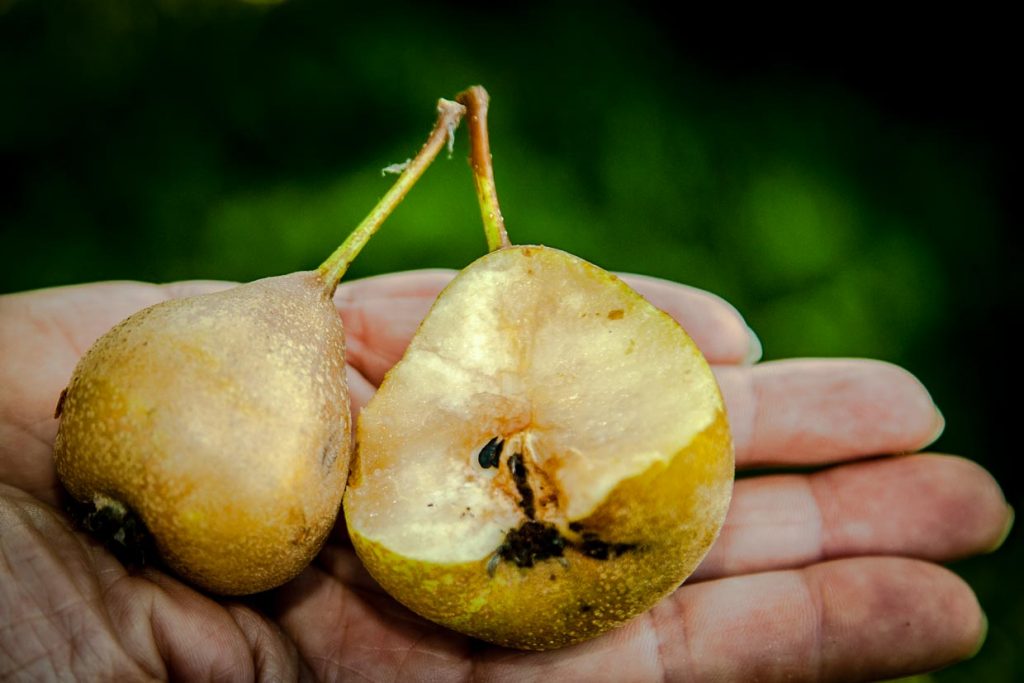
Dependence on the weather and its caprices
When Jörg Geiger recapitulates his discoveries, one gets the impression that adversity threatens from all sides. On the one hand, he feels the struggle against time. Old knowledge is being lost. Even people rooted in the countryside no longer know what to do with the old pear tree and its seemingly inedible bitter fruit. Orchard meadows are threatened because their yields are lower. One is always dependent on the weather and its caprices. The best example is 2017, when the harvest of pome fruit – peaches, cherries, nectarines, apples and pears – was dramatically low. The cause was first mild weather, followed by another heavy frost in April, which damaged the blossoms.
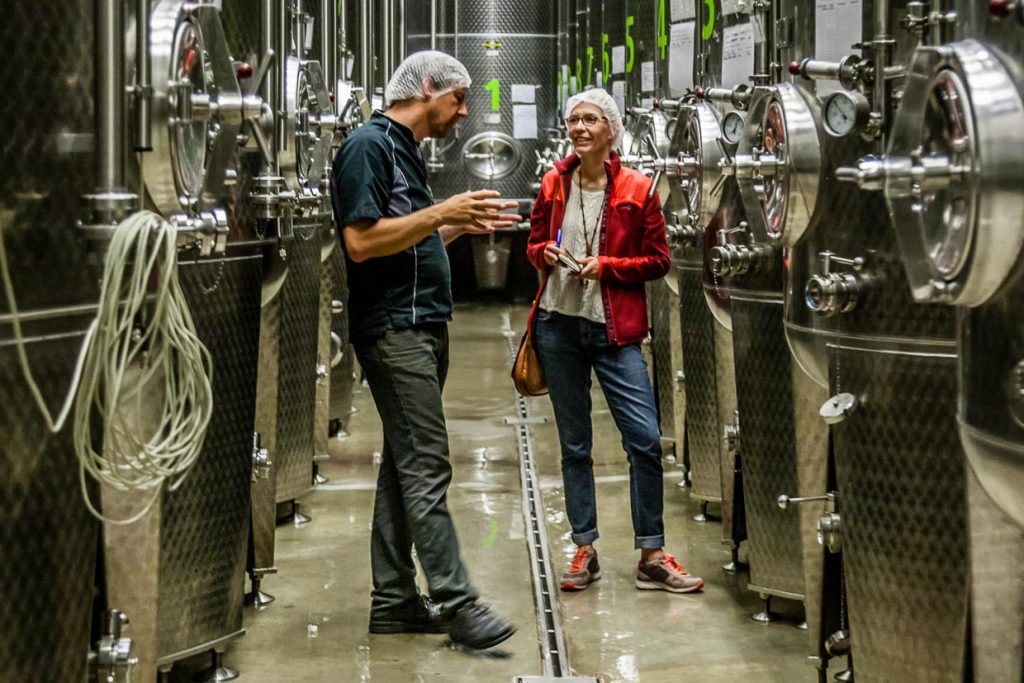
Jörg Geiger is still lucky in the harvest misfortune. 2016 was an extremely productive year. His suppliers showered him with fruit, so that he sometimes didn’t know where to put it. Thanks to the new capacity gained just this year, many of the 10-meter-high stainless steel tanks were filled with up to 12,500 liters of fruit juice. Putting nitrogen on top creates a shelf-stable supply that keeps production going in lean years like 2017.
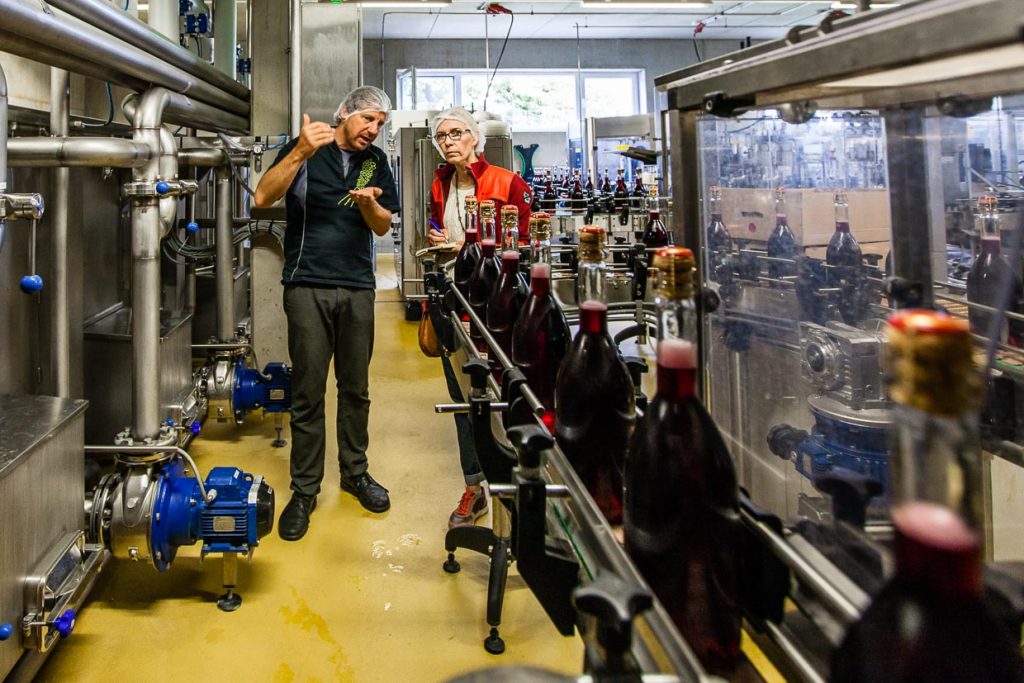
Despite all the professionalization in the ultra-modern plant, the products of Manufaktur Geiger are natural products and vary in taste year after year. The customer must also learn this. In addition, some ingredients, such as woodruff, are subject to a limited collection permit. This makes unlimited production increases impossible for some varieties.
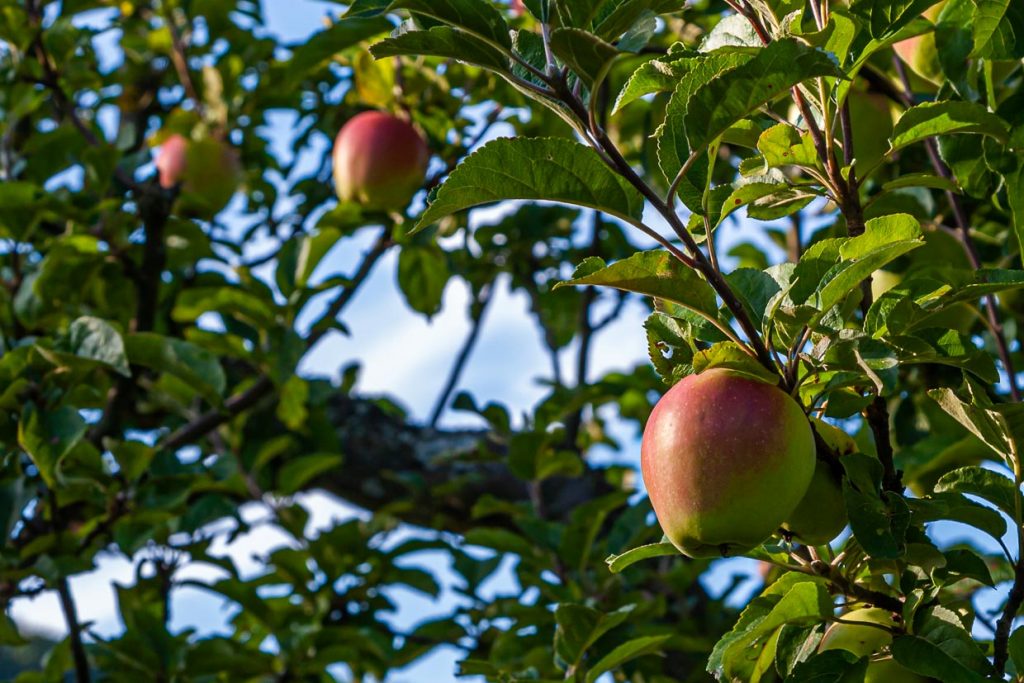
The effort Jörg Geiger makes to be able to use genuine meadow fruit for his constantly growing production is immense. He now has 750 suppliers. From the owner of a farm with a pear tree in front of his house to large-scale farmers, there is everything. Old varieties have a wide flowering window. As a result, one and the same type of fruit can sometimes be harvested over three to five weeks in the fall. The manufactory then accepts single-variety deliveries on a daily basis. Maximum tree ripeness is desired. Ideally, the fruit should not be picked at all, but should fall from the tree into deep grass and then be picked up. In addition, Manufaktur Jörg Geiger is one of the co-founders of WiesenObst e.V. together with Slow Food Germany. The association has set itself the goal of preserving meadow orchards. Among other things, it has developed a bonus system that makes harvesting meadow fruit worthwhile again for farmers.
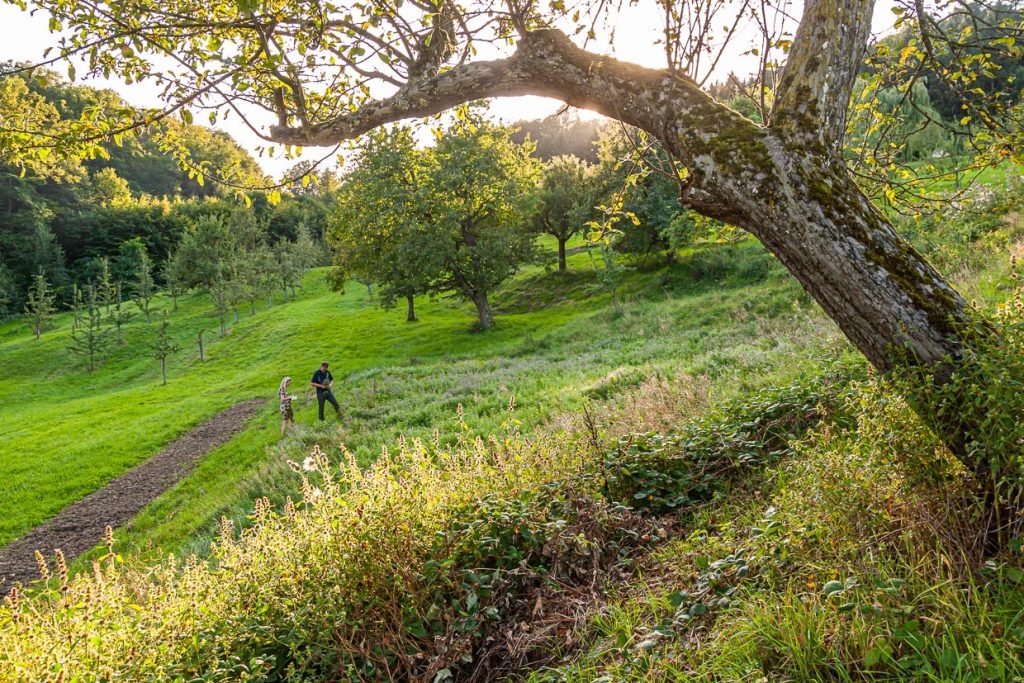
As chance would have it – From imponderability to ignorance
Many of Jörg Geiger’s products are the result of chance. Whether weather caprices or farmer’s shrewdness – many things that are told like an anecdote can now be found bottled on the shelves.
One example is Cuvée No. 11 – Unripe Apple and Oak Leaves. A few years ago, a hailstorm had taken parts of the apple crop off the tree too early. The experiment was to draw the tannins out of the fruit by adding oak leaves. The leaves created a drainage effect that made the unripe apple pressable. Today, Boskoop apples are specifically harvested unripe and Cuvée No. 11, with its elegant acidity, is best enjoyed solo. But also in the mix with the (dont’t call me) gin of the Geiger manufactory, which is not allowed to call itself gin because it is based on apple brandy, number 11 makes a bella tonic figura!
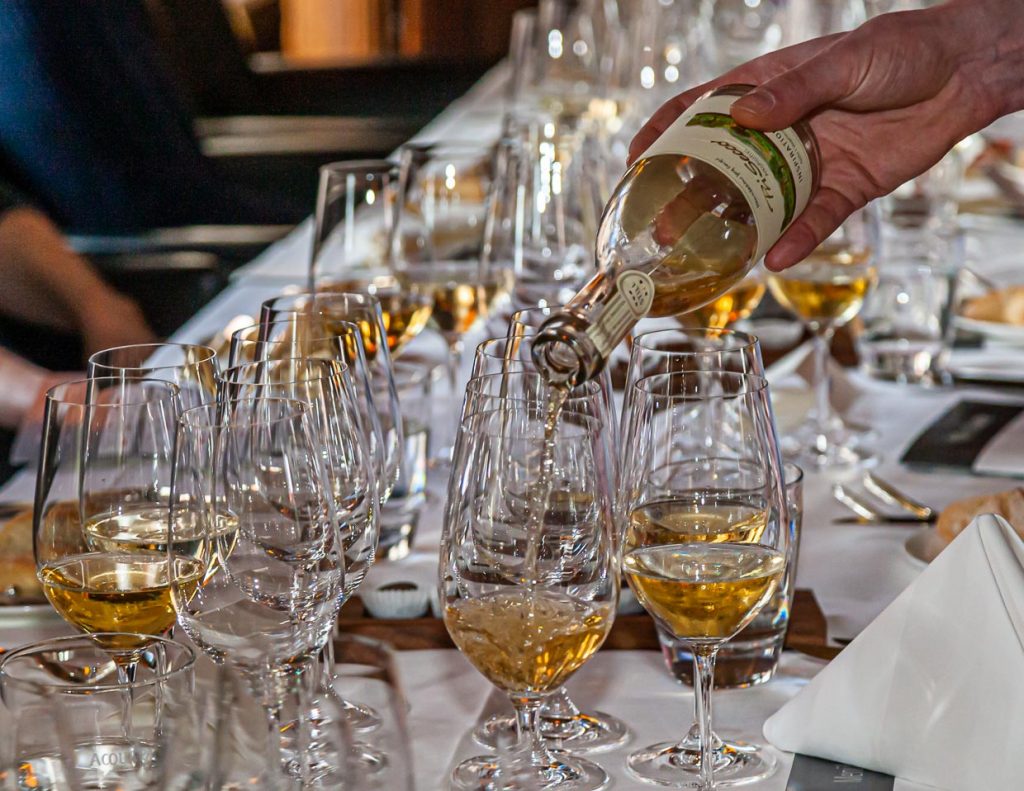
Cuvée No. 17 was created by a clever farmer. Jörg Geiger describes how one summer he stood at the construction pit for the new factory building and asked if he could use heads of lettuce. He asked what else he had. Celery, he replied, and “a few days later he was standing at the reception point with a huge load of celeriac. A challenge for the creative lab. Geiger pressed the fresh celery directly with apples and added the extract of roasted sesame seeds to support the fullness and aroma. The triad of bean apple – celery – sesame was created.
Like a strong handshake – production
Late summer is high season at the plant. Starting at 1,000 kilos, a fruit variety enters the production process. A weekly filling schedule is drawn up. The fruit is washed and sorted. It is then crushed, given a coarse structure and sent for further processing by means of a gentle pressing, which is no more than a vigorous handshake.
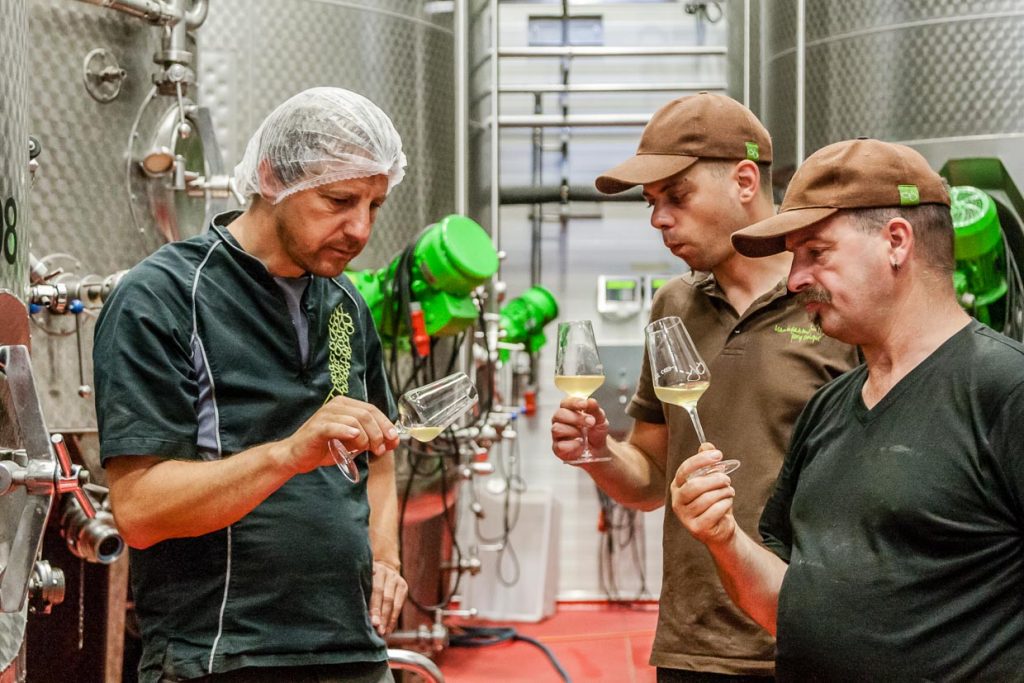
The manufactory’s PriSeccos contain up to 50 herbs, 15 different varieties of flowers, as well as spices and leaves. Each of the currently 36 different varieties of their non-alcoholic PriSeccos is based on complex recipes. Only Geiger and two of his employees have insight into the golden book containing the spice components. Fruit juice technician Martin Wolf and trained chef Martin Recher. With them, Geiger fine-tunes the taste for each new creation. I wasn’t allowed to look in the golden book, but perhaps this sentence of Jörg Geiger’s is written as a preamble: “Observe nature closely and don’t be satisfied with the first result.”
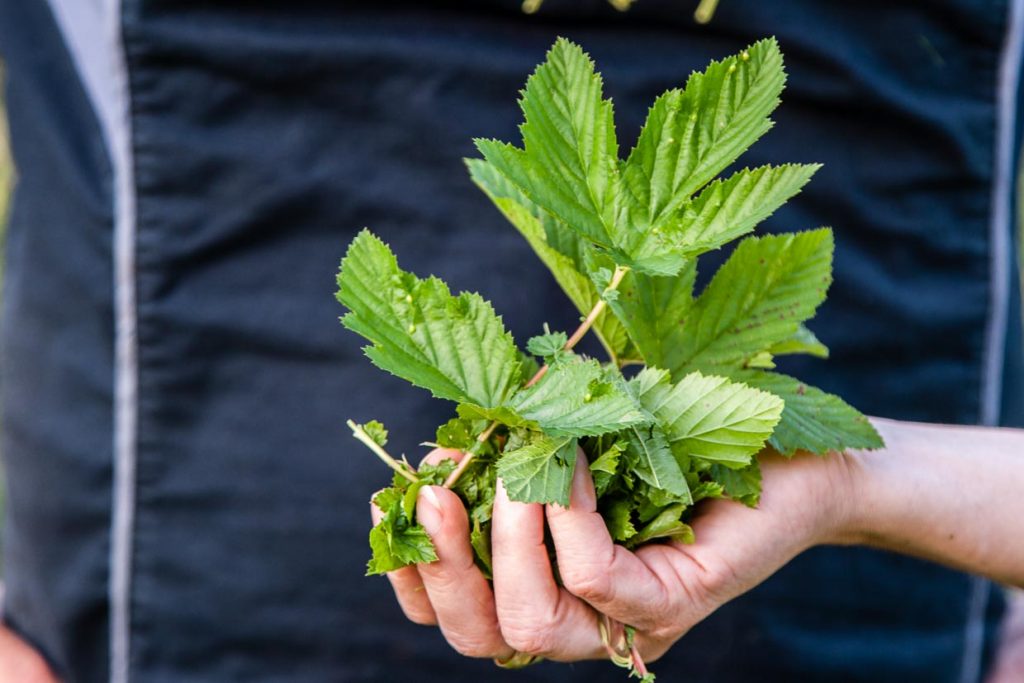
For those who want to learn more about the world of meadow orchards, the Jörg Geiger manufactory has various offers. From a picnic in the meadow orchard, to a guided tasting, to a Sunday tour with the boss. Those who do not want to wait until next summer can always taste through the variety of non-alcoholic PriSeccos and inspiration.
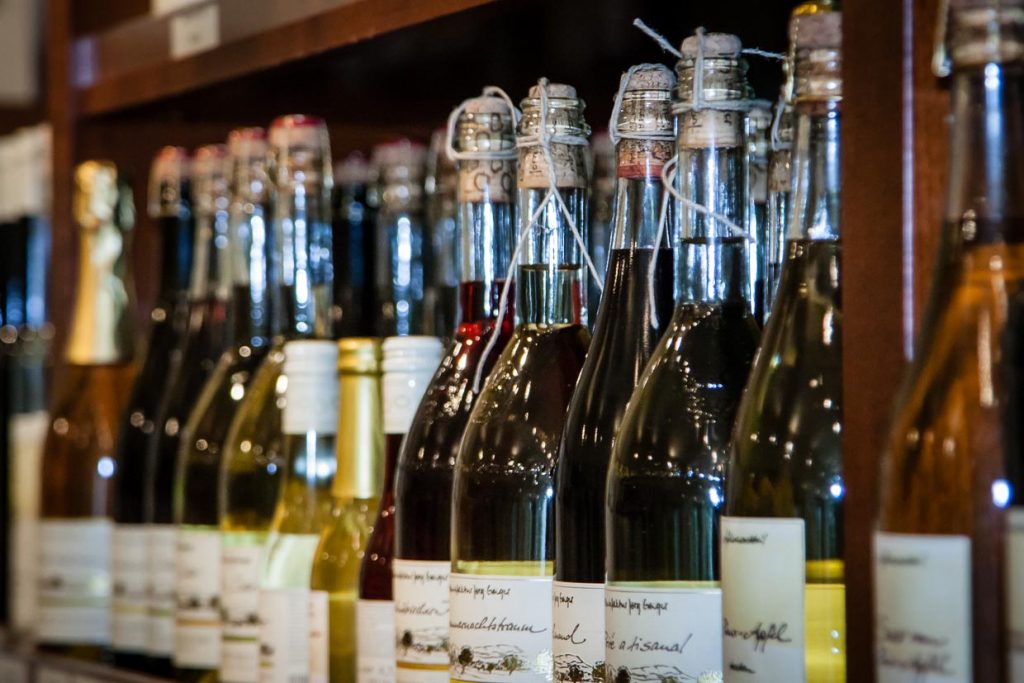
The cost of half board was covered by Jörg Geiger

